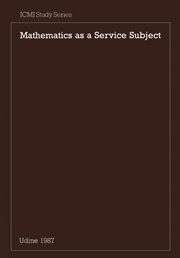Book contents
- Frontmatter
- Contents
- Foreword
- On the teaching of mathematics as a service subject
- What mathematics should be taught to students in physical sciences, engineering, …?
- Mathematics as a service subject – Why?
- Teaching first-year students
- Teaching mathematics to engineering students utilising innovative teaching methods
- Discrete mathematics: some personal thoughts
- Mathematical education for engineering students
- Some reflections about the teaching of mathematics in engineering schools
- Teaching mathematics as a service subject
- A Final Statement
- List of Participants
- Contents of Selected Papers on the Teaching of Mathematics as a Service Subject
What mathematics should be taught to students in physical sciences, engineering, …?
Published online by Cambridge University Press: 26 April 2011
- Frontmatter
- Contents
- Foreword
- On the teaching of mathematics as a service subject
- What mathematics should be taught to students in physical sciences, engineering, …?
- Mathematics as a service subject – Why?
- Teaching first-year students
- Teaching mathematics to engineering students utilising innovative teaching methods
- Discrete mathematics: some personal thoughts
- Mathematical education for engineering students
- Some reflections about the teaching of mathematics in engineering schools
- Teaching mathematics as a service subject
- A Final Statement
- List of Participants
- Contents of Selected Papers on the Teaching of Mathematics as a Service Subject
Summary
I shall try to express a few ideas, related to what could be the beginning of an answer to that question. A first attempt is to make a list of domains of mathematics whose teaching would be useful. One obtains a beautiful catalogue, with the following interesting property: showing it to anybody, you obtain simultaneously the two following answers: a) that is far too much, b) something (very important) is lacking.
One has to make choices, and I shall concentrate on a few related subjects: the distinction between scattered and unifying topics, the question of teaching modern mathematics, the choice of the level of the teaching.
DOMAINS OF MATHEMATICS THAT SHOULD/COULD BE TAUGHT
In some sense, it is an easy question, if you do not choose between should and could, and if you keep the “domains” sufficiently vague. You can ask users what they use, what kind of mathematics they find important or useful. The intersection of the answers gives a very small list, while the union of the answers gives something like the following catalogue:
a) (at an elementary level): calculus including ordinary differential equations, linear algebra, probability, statistics, discrete mathematics, some geometry.
b) (further): complex variables, Fourier, Laplace, convolution, Lebesgue integral, distribution theory. Partial differential equations. Hilbert spaces. Tensor calculus. Group theory. Special functions. Geometry. Calculus of variations. Dynamical systems, fractals, chaos. Stochastic process. Numerical analysis. Non linear phenomena, and so on … (of course, computer science is outside the scope of this talk).
- Type
- Chapter
- Information
- Mathematics as a Service Subject , pp. 20 - 27Publisher: Cambridge University PressPrint publication year: 1988

